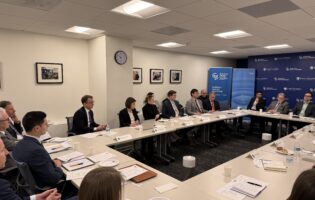A German-American Dialogue of the Next Generation
The eight participants of the Business & Economics Program group came together for their first virtual meeting on September 16, 2016. The discussion focused on the lessons of recent economic crises as well as future challenges for the American and European economies. Among the questions the group confronted were how we see the problems emerging on both sides of the Atlantic and whether we have adequate tools to fix them.
In an era of frequent cyclical economic crises, both Europe and the United States scramble to revive their domestic economies and to prevent future downturns. In Europe, the eurozone crisis has continued with fiscal disparity between countries and struggles to resume growth in some member states. The European banking crisis, which prompted drastic intervention from EU authorities, remains a concern for the long-term health of the European economy as can be seen in daily headlines. The participants found that the insurgency of populism in Europe has suppressed the appetite for more integration at the European level, an approach widely believed by many experts to be the key to bridging the gap between a collective monetary union and individual sovereign fiscal policies. Even in Germany, where economic recovery and growth has been steady, political opportunists are seizing on the popular sentiment to “take back control” from Brussels. Political elites pander to nationalistic tones in their respective domestic audiences, partially because no one has a clear vision about what needs to be done. There does not seem to be a one-size-fits-all solution to addressing Europe’s growth trouble.
In the United States, the campaign battles for the upcoming election highlight, among other things, the growing rejection of free trade in American public discourse. A good number of American politicians, as the participants observed, not only question the benefits of the TTIP agreement, but also Europe’s economic management, citing Germany’s reluctance to adopt more expansive stimulus measures. Many economists in the United States are also pessimistic about the future of the euro, believing that the single currency is flawed and the EU does not have adequate tools to deal with the structural deficits in the monetary union. In the United States, isolationist tones emerging from the presidential election campaigns threaten to portray Europe on the one hand as an antagonistic competitor and on the other as a lagging economic pressure on the global economy.
The participants agreed that the EU and the United States have tremendous stakes in sustained long-term economic growth. Even under the current circumstances, with many doubts and uncertainties about the short and midterm prospects for economic growth, the transatlantic partnership still offers tremendous promise for mutual benefits in preserving free trade and globalization.
The current anti-TTIP sentiment against big U.S. corporations in Europe and U.S. criticism of a sluggish economic environment in Europe distract from the urgent need and auspicious potential of the transatlantic complementary interests. The participating experts suggested that both sides need to gain a better understanding of each other’s economic reality while keeping focused on the central issues at hand. In the larger context that includes rising concerns about economic inequality, the continuing increase in the national debt ratios, lagging growth, serious joblessness among European youth cohorts, volatility in the banking sector, and the centrifugal forces of political backlash waves moving through Europe and the United States. The central questions looming through these challenges are: what is the most effective and realistic equation between stability and growth? What is the capacity of political leaders to deliver a persuasive answer? There is concern on both sides of the Atlantic that lack of confidence in leaders as well as institutions is causing gridlock, which only adds to the frustration in the political environment. This leaves the challenge of offering solutions that are politically acceptable when it comes to enhancing competitiveness, getting a grip on debt, making real headway on structural reform, tax policy, trade negotiations, and strengthening the labor market. In parts of Europe, that runs parallel to demographic challenges and on both sides of the Atlantic there are major issues surrounding immigration policies.
The experts agreed that attempts to reach mutual understanding and agreements on issues that are not all fiercely contested would be a good start to navigating economic cooperation across the Atlantic. Where frictions lie and where opportunities appear will be a central part of the efforts for Europe and the United States to reconcile differences and enhance policy coordination. That agenda will be on the priority list of the new administration in Washington next year and part of the election campaigns in many European countries, particularly in Germany in the fall of 2017.
Meeting report written by Yixiang Xu.







